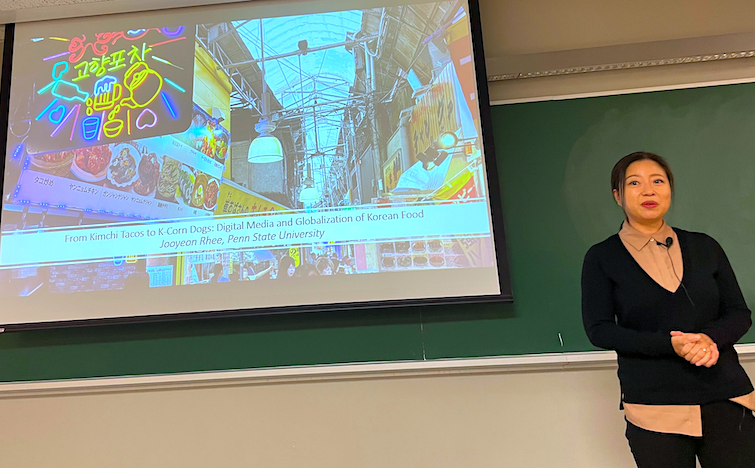Speaker Series: Dr. Jooyeon Rhee
(Pennsylvania State University)
From Osaka to Ottawa, a wave of Korean cuisine is making its way into the restaurants, food trucks, hearts, and stomachs of foodie fans from around the world. But what is behind this trend, where did it all begin, and where will it go next? All good questions and excellent fodder for a recent invited talk by Dr. Jooyeon Rhee, Dorothy W. Gilpatrick University Endowed Fellow in the Humanities and Associate Professor of Asian Studies and Comparative Literature at Pennsylvania State University.
Dr. Rhee is an engaging speaker. Her well-chosen photographs (many her own) really demonstrated the out-size influence Korean food has had on popular culture and on changing palates worldwide. She also did well to engage the audience in her presentation, peppering them with questions about K-drama, K-pop, and Korean history. Many in the crowd (most of them students of Korean language at Carleton) were up for the challenge and demonstrated wide-ranging familiarity with all things Korean.

Regarding questions of Korean history, Dr. Rhee’s talk explored more deeply the political aspects of food, in particular she suggested we consider the South Korean government’s widespread promotion of Korean recipes (hansik) as an exercise in “soft power,” changing attitudes through familiarity rather than through displays of force. She also spoke about the Korean War and its impact on the availability (or not) of particular ingredients and fusion dishes that emerged as a result (e.g. Budae-jjigae or “Army Base Stew”).
Finally, in the latter portion of her presentation, Dr. Rhee drew the group into a conversation about the growing popularity of something called mukbang (basically videos of people eating food in front of a camera) and the social impact/role these videos and their dissemination over social media have had in both a COVID and post-COVID world.
The presentation was followed by a variety of Korean foods including kimbap, japchae, and dumplings.
The event was hosted by SLALS and supported by funding from the 2023 Korean Studies Grant Program of the Academy of Korean Studies.
Related Readings